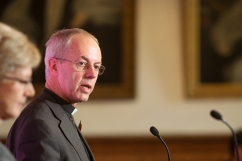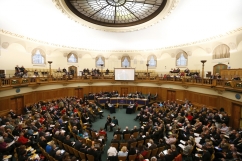
Without my glasses, younger children in my household look at me as though I am a stranger they have never met before.
To me, the world around feels very different.
Last week my glasses were stolen and I became very aware how my myopia caused me to feel disoriented, claustrophic, nervous, and unconfident.
Something similar happens to Christians when we lose our global glasses. We fail to see what God is doing on the world stage and instead we become parochial and introverted, limited in our vision and witness.
For the 31<sup>st year in a row the International Bulletin for Missionary Research (IBMR) has produced its state-of-the-globe report on religious statistics. It's a fascinating read and the meticulous work of the Gordon Conwell Theological Seminary-based Centre for the Global Study of Christianity is to be applauded. Here are five trends that struck me as I read through the statistics.
1. The Church is growing slowest in Europe and North America
The good news is that the Church is still growing in Europe and North America. The increase is small, but there is increase nevertheless. Whether the growth is attributable solely to migration or birthrate I am not sure, but there is still a net increase in the number of Christians in the West. Since 1900 the Church in Europe has seen a 52.2 per cent increase, rising from 368,254,000 in 1900 to 559,900,000 in 2015. But alongside the fact that the world's population has grown by 78 per cent in the same period, those statistics don't sound quite so impressive. Even more challenging would be the change in percentage of Europeans that now claim any kind of Christian affiliation, which is not a figure that the IBMR report currently publishes.
Molly Wall, the programme director of Operation World, adds that amid concern for the overall decline in Christians, evangelicals in Europe can feel encouraged as "evangelical Christianity grew in strength and confidence in most European countries from the 1990s to the present, even while the overall population grew slowly or even declined".
2. The Church is growing dramatically in the rest of the world

The Church has seen dramatic and explosive growth in Asia, Africa and South America. The growth of the African Church in particular is jaw-dropping. In 1900 there were fewer than 9 million Christians in Africa. Now there are more than 541 million. In the last 15 years alone, the Church in Africa has seen a 51 per cent increase, which works out on average at around 33,000 people either becoming Christians or being born into Christian families each day in Africa alone.
Strangely, this statistical growth is often met with some scepticism by the western Church. I often hear derogatory remarks about Christianity outside Europe, North America and Australia. There is a superiority complex when it comes to the global Church. There remains a conviction that Western Christians should be congratulated for heading off on teaching ministries to educate church leaders or for raising funds to correct theological challenges in the rest of the world. Christians in Nigeria and South Sudan are facing extreme levels of persecution and the Church is still growing, but it is rare for Christians in the West to think that we have anything to learn from believers there. Very few of our conference speakers, authors, worship leaders or resources originate from 'the rest of the world'.
So despite stupendous growth and spiritual blessing there is still a colonial mindset in western Churches that wishes to downplay God's work in those countries. Perhaps it is time that our conference organisers, publishers and missionary organisations help the Church in the West to reorient its place in the global Church, ensuring that we approach our brothers and sisters in the two-thirds world with greater humility and a willingness to learn.
3. Christianity is easily the world's largest religion

When every form of Christianity is added together there are more than 2.4 billion Christians worldwide. So just over a third of the world's total population claim some kind of Christian faith. This figure includes what we know as nominal Christians, who may know very little of the Christian faith and may not practise their beliefs, but nevertheless in a census declare themselves as Christian. Islam comes second, with 700 million fewer adherents. Christians in the UK need to remember this when they see church services attracting fewer people than they did before, some church buildings being repurposed as restaurants and homes and the Christian faith losing some of the influence and confidence it used to hold in the public square.
Professor Brian Stanley of Edinburgh University's Centre for World Christianity reminds us Christianity "neither began in western Europe, nor has it ever been entirely confined to western Europe. The period in which it appeared to be indissolubly linked to western European identity was a relatively short one, lasting from the early sixteenth to the mid-twentieth centuries." Christianity used to have its global centre in Israel, then later in Syria and eventually in Italy and Turkey. It now seems that the centre of gravity has moved to Africa.
4. Christianity is ridiculously divided

There are more than 45,000 different Christian denominations in the world today. In 1900 there were 1600 denominations. This a 2712 per cent increase in the division of the Church in just over a century. Most of the denominations that exist are due to disputes, usually over doctrine but frequently over personal conflict. I have personally come across denominations that have been founded because they disagreed with the use of musical instruments in corporate worship. I have met a group that believes black people are the true Jews. But even if you leave aside these obscure groupings, I am sure you will be familiar from your own village, town or city just how divided we are as Christians. We share a common set of core beliefs but insist on meeting separately, often needlessly duplicating what would be more effective and efficiently achieved working together for the kingdom.
Globally the potential for Christian unity is enormous. The IBMR data suggests that the combined earnings of the members of the global Church is somewhere in the region of 42,000 billion dollars. This amount is greater than the total GDP of the US and European Union combined. Christians give around 700 billion dollars away a year, which is more than the GDP of 120 of the world's countries, including Malaysia, Norway and South Africa. These are staggering numbers and used in a strategic way could make a huge impact on the world's poor, the alleviation of suffering and the spread of the good news of Jesus. Unfortunately, while we remain so divided the money is often spent on self-serving or competitive projects or on maintaining duplicate structures.
5. How many atheists?
According to this study there are around 136.4 million atheists in the world, which is about 1.8 per cent of the population. Molly Wall explains that this dataset largely counts as atheists those who specifically mark it on a survey or poll. However, this information would be difficult to ascertain in many places. It is the only "religious" grouping to see a downturn, admittedly a small one (0.2 per cent). This figure could be contested as, for example, a recent Gallup survey of around 50 000 global respondents estimated nearer 13 per cent of the world's population are atheist. Wall points out that Gallup's statistic is extrapolated from a tiny percentage of the global population (around 0.000007 per cent), obviously much less rigorous than the Gordon Conwell figures quoted above.
According to Wall: "Generally speaking, the world is becoming more religious, and that is because the world's largest historical non-religious populations (former Communist countries, especially China) are becoming more religious. Non-religious populations are in decline there, and overall global figures reflect that change."
Conclusion
Despite increasing secularisation in Europe, the Church is holding her own in numbers and atheism is on the global decline. What amazing opportunities this holds for the Church in the world today. As we refocus our global vision, may God help us regain confidence in Him and in the gospel which is bearing fruit all around the world.


















